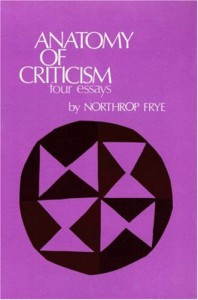Currently reading
Middlemarch: An Authoritative Text, Backgrounds, Reviews and Criticism (A Norton Critical Edition)
The Magic Mountain
Love in the Time of Cholera
 A superior display of erudition.
A superior display of erudition.Sets out its task in terms reminiscent of Kant's assertion that "philosophy stands in need of a science" in the [b:Critique of Pure Reason|18288|Critique of Pure Reason|Immanuel Kant|http://d.gr-assets.com/books/1348663530s/18288.jpg|1072226]: "If criticism exists, it must be an examination of literature in terms of a conceptual framework derivable from an inductive survey of the literary field. The word 'inductive' suggests some sort of scientific procedure. What if criticism is a science as well as an art?" (7). Both Kant and Frye strike me as latter day Miltons, who, within their respective fields, desire to assert Eternal Providence, And justify the ways of God to men.
Frye is of course much more humble about it than Milton (but who isn't?), and, in addressing his miltonic-kantian task, offers this volume as a mere attempt to annotate T.S. Eliot's ideas (18) (which ideas I regard as thoroughly reactionary and dullard). Frye is more lively than that, though, even as he sets out neo-aristotelian schematics, neo-spenglerian distinctions, neo-arnoldian pseudo-sociology. As with Toynbee or Delbruck, Frye's panoramic reading makes plausible associations across time and space, dispelling problems about which I'd been thinking for years in a sentence. That's not to say that he possesses the answer (it's literary theory, after all)--but that he has an answer.
Much like "42," though, sometimes answers arrive without any question requiring their presence. This volume arrives during the height of the New Criticism, and marks out several departures therefrom, including some arriere garde dangers. But it is nevertheless a study of formalism.
We see both departure and danger in one representative passage: "The verbal action of Figaro is comic and that of Don Giovanni tragic; but in both cases the audience is exalted by the music above the reach of tragedy and comedy, and, though as profoundly moved as ever, is not emotionally involved with the discovery of plot or characters" (289). This bit departs from New Criticism by delving into the "affective fallacy," but it's not reception theory proper, as it reduces audience response to the formal categories of the text, rather than carrying out a materialist's inductive survey of actual reception. The latter is laborious, surely--whereas formalist heretic Frye is content to read the form of the operas and decide what an audience should do with it.
Thickest citation block in the index is Shakespeare, naturally, followed by other predictables: Milton, Chaucer, Joyce. His commentary on individual texts is usually very impressive, such as classifying Shakespearean plays and whatnot. An example: the text lays out a tidy scheme for prose fiction--the novel is extroverted and personal; the romance, introverted and personal; the confession, introverted and intellectual; the menippean satire, extroverted and intellectual (308). Texts can partake of any of these prose fiction genres simultaneously--and therefore the genius of Joyce's Ulysses (and I agree) is that it registers on all four in a unified manner (313-14). Slick, surely.
But the slickest bit is self-referential. Noting that "menippean satire" is unwieldy and misleading as a designation, Frye adopts the term anatomy, eponymous of Burton (311). The anatomy as genre is marked out "by piling up an enormous mass of erudition" and "in overwhelming pedantic targets with an avalanche of their own jargon" (id.). Its object is "mental attitudes" such as "pedants, bigots, cranks, perverts, virtuosi, enthusiasts, rapacious and incompetent professional men" (309). There's much more to be said in platonist definition, but wittgensteinian examples sometimes work better: Lucian, Erasmus, Rabelais, Swift, Apuleius, Petronius, Voltaire, Burton, Joyce are practitioners; best known works of the genre: Moby Dick, Tristram Shandy, Don Quixote, Brave New World. Even Boethius is considered in this connection. (I'd add that the subtitle of [b:Kraken|6931246|Kraken|China Miéville|http://d.gr-assets.com/books/1320551670s/6931246.jpg|8814204] should get us to think of Mieville seriously in terms of menippean satire.)
With reference to this text's own title, we can only conclude that it signifies as assertive, persuasive rhetoric regarding a non-literary purpose, as laid out in the statement of authorial purpose, supra. Frye then notes that allegedly "non-literary prose" might be read in a literary way by criticism (326 ff.). This means that Frye's non-fictional anatomy should be read also as an anatomy in the tradition of Lucian and Sterne. It's a big satirical fuck you! to the literary theory establishment as well as a love letter to same.
Recommended.





